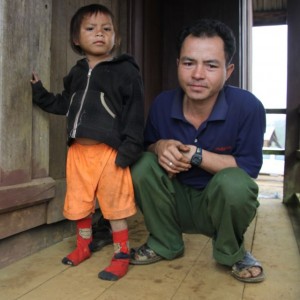Parents make their daughter’s treatment a priority. Even higher than securing their next rice crop

Before treatment Loi’s feet were severely twisted and she had to walk on the sides of her feet. Each year it became more difficult for her to bear her own weight.

Loi’s father stayed with her for five months while she was undergoing therapy. Her mother tended the farm and gave birth to another baby while her husband was gone.
Unfortunately, the cost of outreach commonly exceeds the cost of the services provided. Stated bluntly, it costs more to identify people with disabilities and transport them to Vientiane than it costs to fit them with suitable appliances.
Another challenge is to create a public awareness of what physical conditions can benefit from therapy and which cannot. Time and again, when our team is working in a remote village we encounter people with treatable medical conditions who have no idea that an intervention is possible. Or, if they hope for treatment, they have no knowledge of how to pursue help. Such was the case with Loi’s family.
Loi was born with a condition commonly called “clubfoot” (congenital talipes equinovarus). Both of her feet turned inward, and since she never received therapy, when she learned to stand and to take her first steps she actually walked on her ankles. Villagers who saw her spoke of the girl with “her feet on sideways”.
When We Help War Victims met Loi and her family in 2014 it was clear that she faced a bleak future. Already, at the age of three, Loi could barely carry her weight on her twisted feet. She would take a few halting steps and then ask to be carried in her mother’s arms. Of all the children in Laos that I have met with this condition, Loi feet were the most disfigured and distressed. Having received no early intervention the chances of her making anything approaching a recovery seemed remote.
We Help War Victims carried Loi and her father to the COPE satellite center in Pakse, in southern Laos, but the staff there felt that her condition demanded the skills of surgeons and therapists at the main COPE center in Vientiane. They immediately put her on a bus to the capital.
Before we intervened on behalf of Loi we obtained assurances from her father that he would commit keeping Loi in therapy until the physicians and therapists concluded that no more could be done.
Secretly, I harbored little hope. Loi’s parents are subsistence farmers whose very lives depend on all members planting, tending, and harvesting their crops. For Loi’s father to be called away from the fields for several months would, without a doubt, work a hardship on the family and perhaps leave them struggling on short rations for an entire year.
When I last saw Loi and her father in Vientiane in April 2014, the little girl was bound by plaster casts on both legs, for the purpose of slowly repositioning her feet. (A therapy developed by a physician at the University of Iowa. Let’s hear it for all Hawkeyes!) Her doctors predicted that subsequent to her bearing as many as eight sequential castings she might need multiple surgeries. I hoped for the best but didn’t expect a good outcome. My fear was that Loi’s father would withdraw her from therapy too soon for her to experience a lasting improvement.
This week, braced for disappointment, I journeyed to Loi’s village to check on her. I was overjoyed to see her standing squarely on repositioned feet and walking with a near-normal stride. When I asked her father if he had, indeed, remained in Vientiane for the full three months he replied, “Three months? We stayed for five! Other people told me to go home to my farm and my family, but I said I want my daughter to have normal feet so I’m staying until the doctor tells me to go”.
This week, We Help War Victims will again convey Loi and her father to a COPE center. The National Rehabilitation Center staff sent her home with braces that she must wear for the near future but those devices soon wore out and Loi’s father couldn’t afford a trip back to the center to have them replaced or repaired. I have assured Loi’s father that his dedication has earned our continued support; he and Loi leave the day after tomorrow for COPE in Pakse.
To make certain that proper credit is give to both of Loi’s parents, I will point out that in her husband’s absence, Loi’s mother tended the farm, cared for Loi’s three older siblings, and (yikes!) during the months that her husband was absent gave birth to another baby!
And on a humorous note: the last time I saw Loi I presented her with a soft, cuddly teddy bear. But…since she had never before seen a stuffed bear…she screamed for help and threw herself into her father’s arms. Yesterday, her father assured me that Loi eventually warmed to the bear and now sleeps with it.
